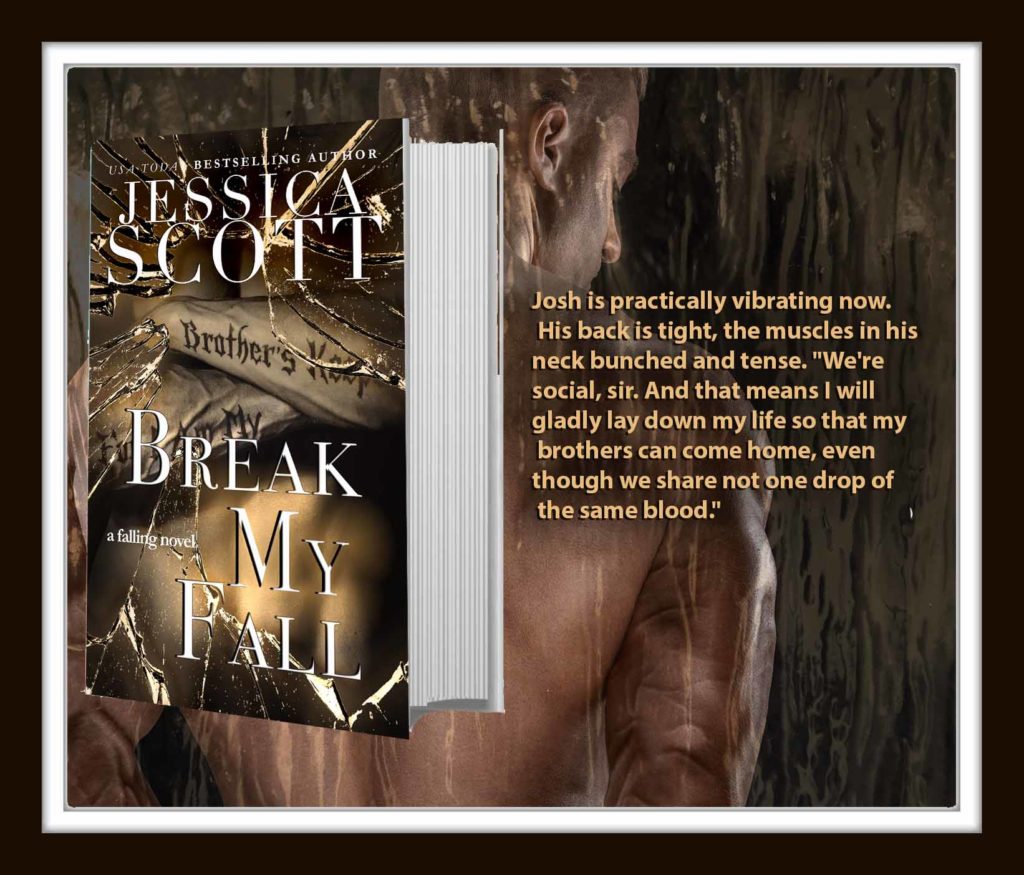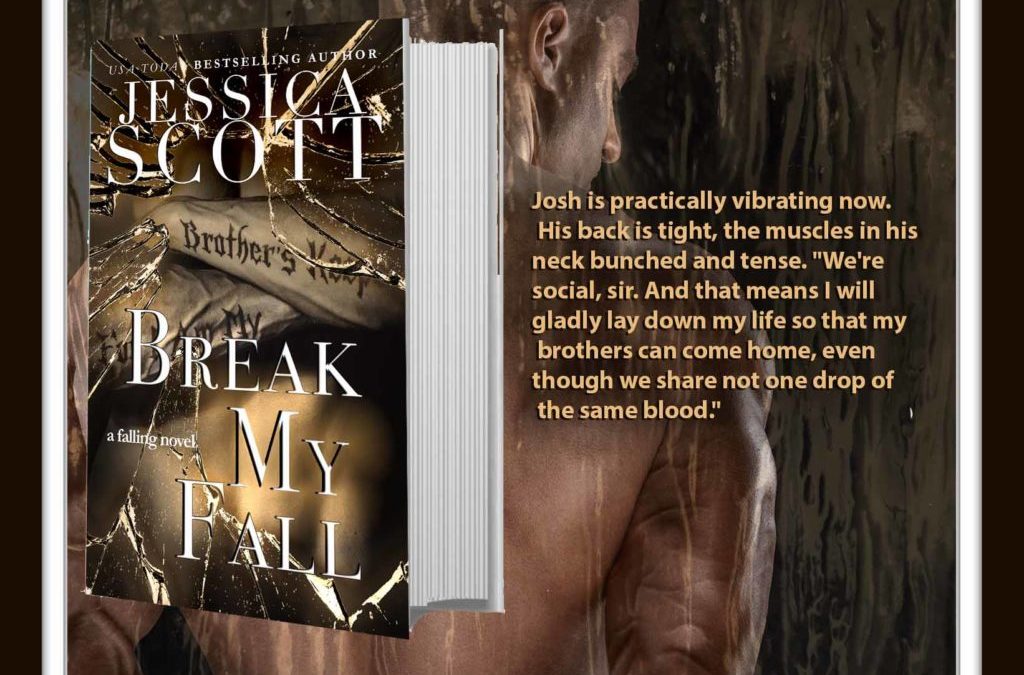
#grumpysunshine #enemiestolovers #bookstagram #bookstagrammer #angstyromance #newadultromance #authorsofinstagram #amreading #amwriting #booklovers #booksofinstagram #booknerd #romancereads #romancebooks #contemporaryromance #booktok #smutreaders #militaryromance #bookish #smutreaders #collegeromance #bookofthemonth #bookrecs #spicybooks#bookrecomendations #romancereadersofinstagram #readersofig #romancereader #smalltownromance #bookworm #booksta #booklover #coho #alphahero #oppositesattract #homefront #cominghomeseries #jessicascott #bookofthemonth #top10books #romancebooksofinstagram #whattoread #romancelandia #bookboyfriend #bookish #spicyromance #newadultbooks #bookblogger #mustread #smuttyromance #steamybooks #spicybookstagram #romancecovers #goodreadsromance #goodreads #tbr #netflixbooks #netflixromance #passionflix #booksofig #shelfie #ilovebooks #bookobsessed #bookreviews #bookgram #booksbooksbooks #indieromance #romancebookstagram #bookaddict
BREAK MY FALL Chapter Twelve
Josh
Professor Quinn surveys the classroom, his expression blank even as his gaze lands on us, then he moves to his podium and opens a well-oiled leather folio. The kind of folio that looks like old money without even trying. “Your assigned readings from this lesson argued that violence was declining around the world. Despite war in the Middle East, various conflicts in Africa, the rise of gang violence in Mexico, just to name a few, the author argued that violence is indeed declining. Do you buy his argument?”
I sit there, studying my pen and the blank sheet of notebook paper in front of me. Half the class has their laptops open to a game or to the latest social media site. I’m a little old-fashioned, I guess.
“Mr. Douglas, what do you think?”
I buy myself a moment by breathing deeply, holding it until my lungs burn, and releasing it. “I don’t buy it. His argument doesn’t hold up to even the lightest inspection.”
Quinn motions toward me with his open palm, his thumb cradling the presentation remote. “And why don’t you buy it? We haven’t had a major world conflict since the end of World War II.”
I flick the end of my pen off and back on again but Abby interrupts. “True, sir, but he’s arguing that violence across the board has decreased. Pointing to the lack of a major global conflict suggests that the level of state-sponsored violence may have declined, but it does not suggest that violence overall has decreased.”
I can feel everyone’s eyes on us as Quinn digests her answer. Then he nods once. “Very good, Ms. Hilliard. Does anyone want to argue against this?”
Of course, Parker’s hand goes up. “Sir, I don’t think you can argue that violence isn’t declining. We see an overall decline in violent arrests in the United States. The countries of the old Western Europe have some of the lowest levels of violence in the world. And even in places that are modernizing, you’re seeing the tide turn against violence. India, for example, is finally starting to protect women and girls from violence.”
Quinn nods again. “Fair enough. What is leading this trend?”
“Secularization,” Abby offers. “Places that see decreased religious intensity typically see a corresponding drop in violence.”
“Right, Ms. Hilliard. So if secularization is leading to reduced violence—Yes, Mr. Douglas?”
“Sir, I don’t think we can accept that secularization is leading to reduced violence because I don’t believe we’re actually seeing a reduction in violence. The author bracketed the wars in Iraq and Afghanistan, basically pulling them out of his sample to make his argument. The end of the Cold War has made the world less safe, not more.”
“Why do you say that, Mr. Douglas?” Quinn sounds interested, not offended, which I’m taking as a good thing.
Except that now I have to keep going. And sooner or later, this conversation will derail into something personal. Something that pushes at the edges of my control. Guess I should have quit while I was ahead.
Abby
Josh is engaged, and it is a sight to behold. Fired up and participating in the discussion in a way that’s not threatening to Professor Quinn. Which is good. Very good.
The tension in him from that first class isn’t there, or if it is, he’s transformed it into something else. Something…he can use.
“The war in Iraq. The fall of the Iraqi government. The collapse of Syria. We don’t even know the full weight of the casualties from these conflicts,” Josh says. “But I can also tell you that violence has definitely not decreased. The fall of Saddam allowed old scores to be settled, and believe me, they were settled. Violently. The author doesn’t get to throw the last fifteen years or so out because they don’t support his argument.”
“So your argument is that the wars in Iraq and Afghanistan are evidence of more violence, not less; is that correct?” Professor Quinn remarks.
“Yes, sir.”
Parker’s hand shoots up. “These are religious conflicts,” she says. “If we continue to advance education initiatives around the world, we can continue the gains that the introduction of reason has had on the advancement of civilization.” She shifts and looks like she’s enjoying herself tremendously.
I raise my hand. “There’s no evidence that religion is actually on the decline. It’s growing rapidly even in places where it’s supposedly gasped its last. In Europe, more people are identifying as religious—just not Christian. In South America, the fastest growing religion is Pentecostal. And religious people have more babies, so even if we accept the premise that religion is declining in the current generation, there’s no guarantee that it will continue to decline once the children of religious individuals grow up and take their place in the adult world.”
Quinn holds up both hands. “Okay, so clearly we have some impassioned opinions on each side. One side suggests that violence is declining. The other says that it’s an illusion. So why does it matter?”
It’s a simple question, but beside me, Josh tenses.
“What?” I whisper.
He shakes his head, looking down at his hands. His knuckles are white on the pencil.
“War,” he says softly.
Quinn looks up at him. “A little louder, Mr. Douglas?”
“War. If violence is actually declining, it takes away the need for war. It makes war unnecessary.”
“Well, then the military would be out of a job.” Parker smirks over at him, and I instantly want to throttle her. “And war is never necessary.”
Josh twists the pen violently between his fingers. “I don’t think that war will ever become obsolete. There are some who will not be reasoned with.”
Parker shakes her head. “You’re not going to argue about the power of belief again, are you?”
He swallows hard, his fingers twisting that pen like he’s going to snap it in half. “I wouldn’t underestimate it. How else can you explain mothers willingly sending their children to be suicide bombers?”
“Mental illness.” Parker shrugs. “Clearly, only someone who is clinically insane would send their child off to die. It’s contrary to what we know about human nature. We are fundamentally selfish, and we are trying to pass our genes along to the next generation. Killing them doesn’t make any sense.”
“I have to agree with Parker.” I shoot Josh an apologetic glance. “It doesn’t make any sense. Humans are selfish.”
Josh shakes his head. “I disagree. He has no greater love than he who would give his life for another.”
“You’re quoting a religious text to make your argument?” Parker asks, and her words are laced with skepticism and a barely concealed sneer.
But Josh doesn’t back down in the face of her contempt. “If we accept that there are some fundamentals about human nature buried in religious texts, then yes, a religious statement makes my argument. We’re not selfish—not like rational choice theory would have us believe.”
“If we’re not selfish, what are we?” Professor Quinn asks. “And what does this have to do with violence?”
Josh is practically vibrating now. His back is tight, the muscles in his neck bunched and tense. “We’re social, sir. And that means I will gladly lay down my life so that my brothers can come home, even though we share not one drop of the same blood.”
A slow smile spreads across Quinn’s face. “Mr. Douglas raises the fundamental problem of violence—how does it enable social cohesion while at the same time being so destructive?”
Parker’s hand shoots up. “Wait a sec. Is violence declining or not?”
Quinn clicks on a slide that shows a single graph with a massive spike in it toward the right side. “From the data that we have—and mind you the data is actually quite terrible—what we see is that violence tends to hover around this trend line. But periodically, there are spikes. The last great spikes were World Wars I and II. This suggests that violence is neither increasing nor decreasing, but rather is merely returning to its normal levels after a massive global conflict.”
I frown, thoroughly confused by the entire discussion. “What are we supposed to take away from this?”
Quinn flips to an image of a mushroom cloud over an island. “This class is centered on violence. But violence and religion are intertwined, it seems, so we cannot have a discussion about one without the other. It’s easy to accept the argument the author makes that violence is declining because we want to accept it. But if religion is merely lying dormant—and all demographic information seems to suggest that this may be only a passing trend, then it means we should expect to see a greater resurgence of religion, not a decrease.”
“Which means a resurgence in violence,” Josh says quietly. “More war.”
Parker shakes her head and shoots her hand into the air. “Sir, I have to disagree. The current generation is the least religious in history. They do not identify as religious. How will their children take up this belief system if it’s not taught to them at a young age?”
Just like that, the light bulb goes off. “It makes perfect sense. How many kids are you going to have?” I ask Parker.
Parker shrinks from the question. Just a little but it’s enough that I notice. I didn’t mean to strike a nerve, but clearly I did.
“Right. And how much of the American population is in college right now?”
She shrugs. “I don’t know. Half?”
“Less than a third,” I tell her. “Which means that all those people out there not going to college are likely having babies. If even half of their babies are religious, it’s more than any of your babies because you didn’t have any. Religious people and less educated people have more babies. Which means that when their kids grow up, there’s a strong likelihood that they will be religious or uneducated just like their parents because we know that parental religiosity influences their children’s.”
I’m trying to focus on Parker, but it’s Josh who is claiming my attention. The discussion is about violence, but damn if I don’t feel actual violence radiating off him in pulsating waves.
I touch his shoulder as the focus of the discussion shifts away from Josh and me. “What’s wrong?”
He shakes his head once, and I let him be. Now is not the time. But something about this conversation set him off.
A cold worry slides down my spine to wrap around my belly.
**ONE CLICK BREAK MY FALL**
JESSICA’S BOOKSTORE | AMAZON | APPLE BOOKS | BARNES & NOBLE | KOBO | GOOGLE PLAY

